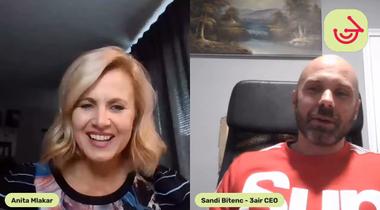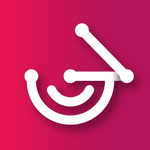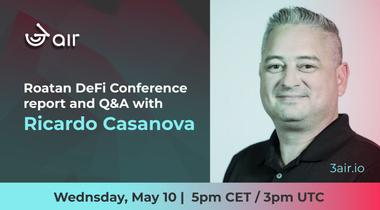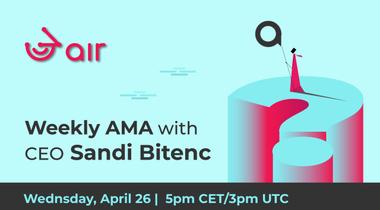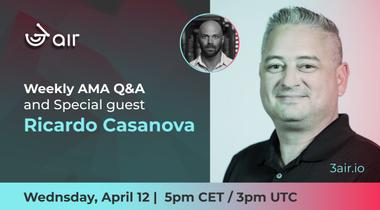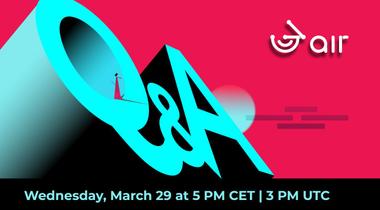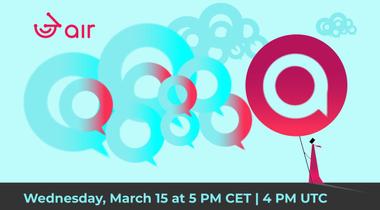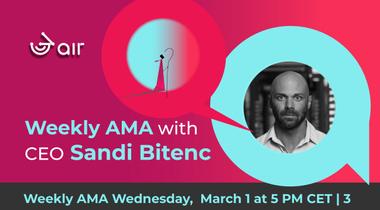This is a transcription form the YT live video recorded on 28th October 2021 @5pm CET
Anita Mlakar: 00:02
Dear ladies and gentlemen, dear participants of 3air’s AMA. Hello, and welcome. We are live for the first time, I am very happy to have you here at all the platforms that we are streaming to right now. My name is Anita Mlakar, and I am, and I will be the host of this events every Wednesday at 5pm Central European Time. So put that in your notebook or calendar.
00:30
Yes, we will be with you every week, we will be presenting 3air and bringing you closer to their projects and solutions and of course, building our community.
00:41
So, thank you again for being a part of this community and of this event.
00:46
Now, let me welcome and introduce to you our main speaker at this meetings. He is the CEO of 3air Sandi Bitenc is with us today.
00:59
Hello to Ethiopia. Hello, Sandi.
Sandi Bitenc: 01:03
Hi, Anita. Hi, everyone.
Anita Mlakar: 01:06
How are you today?
Sandi Bitenc: 01:08
Well, I’m good. I’m actually good. I was looking forward to these AMAs now for a few weeks and here in Ethiopia. We’ve been filming a lot these last days and what we’ve seen is quite amazing. So, even I was surprised.
Anita Mlakar: 01:29
Okay, you will tell us a little bit later more about this.
01:33
Now, first, you know to start from somewhere. Let me do a little introduction give some general information about 3air and our projects because it will be easier for all of us later on and I would also like to invite all of you, participants, of course to ask questions, you are welcome to ask anything you want to know. So just write them down wherever you are. Whatever is interesting to you and Sandi will be the one answering later on all of your questions.
02:05
So now let’s start with this introduction. Okay, 3air was born out of the wonderful combination of traditional telecom business model paired with cutting edge microwave technology and brilliant blockchain ecosystem. So 3air not only about connecting the unconnected, but it’s also about banking the unbanked and giving people of developing countries equal opportunities.
02:34
Talking about developing countries, let’s focus on Africa. There are so many bright minds in Africa that just get unnoticed maybe only because they don’t have the means to educate themselves or communicate with the world out there. So, connectivity is the problem in developing countries. And Sandi, you have written in your blog, I am quoting you, just imagine it, we get to launch our offices each month in Sierra Leone, because people need to come in to pay for the monthly internet subscription in cash. If you’re from Europe, or the United States, or a similar country where everyone has a credit card and the bank account. That’s just unimaginable, right?
03:22
It is also similar with IDs, when you get a handwritten business card as an ID something needs to change indeed. So, there is the potential of solving those problems by incorporating blockchain technology and in 3air, we care, and Africa is ready for a change. And this is not a typical sport neighbor. That is just opposed to anything new adoption of cryptocurrencies in Africa are far above average, despite the challenges in connectivity, technology, and education.
03:58
And why? Because they need to change. And it seems Africa would just jump over a whole generation of finances, they will get from having no bank accounts, and no credit cards directly to the blockchain payment solutions and decentralized finance. It is 3air’s vision to provide this opportunity to such a promising nation, free access to information is a basic human right and it has the power to change the world for the better. So, what do we want to do is to connect the unconnected and give them the opportunity to shine to change their lives? And of course, to change ours.
04:41
3air’s mission is to connect Africa’s unconnected population to the rest of the world through blockchain based ultra-fast wireless broadband access.
04:52
The lack of fast stable and affordable access to the internet connection in most parts of Africa has direct economic costs sequences besides limiting people’s potential to grow, now Africa is home to more than 1.3 billion people but less than a third of population in Africa have access to broadband internet, which mostly relies on edge or 3G Internet services, known for being slow. So 3air is making giant strides already and working around the clock to deliver the best broadband services to Africa. Starting with Nigeria.
05:30
I could go on and on about this about the vision and the goals. And of course, the opportunity that this project holds for us, but I think it is best to continue this conversation with the person who is responsible for the whole idea and is making this big change together with his team. Sandi, I have already introduced you at the beginning, but I will do it again. So again, I would like to say hello to Sandi Bitenc, the CEO of 3air. Sandi, I have made this short introduction of everything that you’re doing, and a part of this introduction is also getting, or the main part is getting internet to Africa. And you are there right now in Ethiopia. Is this a part of this project?
Sandi Bitenc: 06:20
Of course, yes, it is a part of a project. So, we are already planning to come to Africa with solution also. And you can probably even see what I mean, because our connection isn’t the most stable right now. Right now, I already see you with a bit of a lag and there are a bit of squares in in your video stream. And I’m actually right now here in a very good place. I’m just a bit out of the main capital city. It’s actually called the capital of Africa. So, I’m on the border of Addis Ababa, it’s actually still a part of it. I’m in an area where there is not a lot of people right now, there are new houses being built here. And there’s still- it’s a good connection. So, we have a mobile tower here and the connectivity is only mobile. So, we get like LTE here. So, this is how I’m streaming right now. But still, even if we have this connection, it’s not the most stable one but going around Ethiopia, and Addis it’s far worse than what we are experiencing here right now. So, most of the connectivity was 3G, some was 2G, sometimes we got LTE, even in the middle of the city, we were in a bank. In a bank, we got down to EDGE and they didn’t have any other connection there. So yeah, you can say that it’s quite a challenge right now here. So, this is something that we want to change and not only here, throughout Africa.
Anita Mlakar: 08:13
Yes, I saw that you were not only in banks, but also in the national schools that there is no connectivity and thinking that we are in school and want to do things with internet and learn. This is really the same with also the children, right?
Sandi Bitenc: 08:31
Yeah, today, in the morning, we were at the school here and we purposely chosen like the newest and the best school, it’s Cambridge International School. We’ve been talking there to the principal and he’s really keen on using internet in learning, we actually attended a class with whatever, teaching people/children about the internet, and about technology. And they actually have pretty good internet, but it works only when nobody’s connected. So, we were trying to connect and do the speed test. While they were having class, so while they were having class, they weren’t connected to the internet. And it worked pretty well. So, we got like a 60 megabytes of download speed. So that’s really good but then when the class was over, and all the children went out and connected to the Wi Fi, it just dropped, so we couldn’t even get like one megabyte of download speed. So, it is still a challenge, and they build a school like a few years ago, they opened it up last year in 2020 and that’s actually they said that that’s the best internet connection that you can get in the city right now.
Anita Mlakar: 10:02
Unbelievable. We cannot imagine that. Now Sandi, what are the reasons for such low broadband internet adoption rates across the whole Africa?
Sandi Bitenc: 10:13
Yeah, I would say that probably the main issue is that once the city started forming, they had no real idea and a plan to get the cables to, when there was still time to get the cables in for internet. And then the cities just expanded so rapidly, and so uncontrolled that right now it’s impossible to go and dig trenches and lay cables there, you cannot just stop the traffic here, the traffic here is really something special. I can tell you this, I was driving it today for the first time and it is scary. And I’ve driven in a lot of countries and this one was probably one of the most adventurous. So, you cannot just go and dig trenches and lay cables to connect the people right now. And I think that’s the main problem, why there is now really wide adoption of broadband.
Anita Mlakar: 11:22
I Have a question, I was thinking, do these big private actors such as Google and Facebook, have an interest to invest in this area in order to make this internet better?
Sandi Bitenc: 11:35
Well, I’m pretty sure that they have. There have been a lot of attempts to doing it. So, Google was trying it with some balloons and such stuff but right now, nobody has the technology to actually bring broadband to these developing countries. So, we don’t need to speak only about Africa but Africa as a whole, has this big connectivity problem. So, there’s a lot of bandwidth just going all around Africa. So, you have those really big cables, transatlantic cables, and those are all here around and some even penetrate a bit the continent but the last mile solution, nobody actually solved that one yet. And just maybe, to give you an idea about what the investment would be here, if you want to cover Africa with broadband, World Bank gave an estimation in 2019, that it would take more than a decade to cover it, and more than $100 billion. So, I think that’s the next problem. Even if somehow possible it would cost the over $100 billion.
Anita Mlakar: 12:57
Yeah, where to get that money and that investment. So, what the goal is, is to bring high speed and stable Internet to Africa and what I would like to know Sandi is, what is your solution? What is the advantage of that solution?
Sandi Bitenc: 13:11
So, the advantage that we are having is that we have access to a really cool technology that can bring broadband connectivity through air, so we can do it actually wirelessly and we do it a bit differently than the mobile tower. So, we set up a similar tower, but our tower has reach of around 50-kilometer radius. And we can connect up to 15,000 people and 15,000 end clients to one tower alone. And what our towers can do is they can go up to one gigabit per second so that’s actually optics great connectivity of broadband that we can deliver. And with that, because we don’t need to dig trenches and lay cables. We just set up a few base stations, it reduces the costs by a lot, by 100 times. And we can set up a broadband connectivity and cover the whole city within about six months actually. So, I think that’s really huge advantages.
Anita Mlakar: 14:31
Yes, it is. Have you tried it yet? Did you make a test?
Sandi Bitenc: 14:35
Yeah, so the technology has been developing for over a decade and the technology is actually coming from Slovenia, where I am. And it’s already deployed in over nine countries. Also, some is deployed in the US. Some is deployed in Spain and so on but our partner K3 that we are working actually really closely together with, they have their own ISP, their own Telecom in Sierra Leone. So, Sierra Leone was set up as a testing ground two years ago, just because it’s actually perfect for testing this kind of technology.
15:25
First of all, it’s small, the main city, Freetown is 1 million people. So, we said, okay, let’s go and try it there. Even if something goes wrong will do really big damage but nothing went wrong, everything is actually going really well. So, we’re operating there for two years now without any issues, growing steadily 5% month on month, we have over 2000 clients now connected. And what’s also special with Sierra Leone is that it’s even for Africa standards, it’s really a poor country. So, paying for those internet services is quite tough. And there’s the problem that the terrain is there’s a lot of hills and we saw that Hills might prevent us with covering the city really well, but we actually set up only two towers there and with two towers, we cover 96% of the whole city and we actually have also the solution how to cover the next 4% so that we can actually cover everybody in in Freetown.
16:46
The second thing what’s really special about Sierra Leone is that it has a really heavy, rainy season and I don’t know if any of you have satellite TV, but satellite TV actually doesn’t work when it rains, and we were also a bit concerned if our technology would be affected by weather, but I can say it’s not. It’s working perfectly even in the most harshest environments, storms, wind whatever, it works perfectly.
Anita Mlakar: 17:23
Okay, now, we were talking about Sierra Leone right now but with this project, now you’re starting in Nigeria, why Nigeria?
Sandi Bitenc: 17:33
Well, it’s easy. Nigeria is known as the gold market of Africa. So, it’s big. let’s say we can say it’s wealthy. So, for sure the standard there is far higher and also the terrain is good for us. So, what we are looking at first just getting as many people on the internet as possible and it brings two things. So, the one thing that we actually want to connect people and to empower them to give them the opportunity to participate in the global economy and we’re sure it’s good for our project because the more the more users we get on our platform, the more valuable our token becomes and our platform and the project as a whole becomes more recognized in everything.
Anita Mlakar: 18:26
Okay, you were mentioning platform, could you tell us a little more about the platform?
Sandi Bitenc: 18:33
Yeah. So, the platform varies not just, so that it looks nice or it’s something blockchain, but we started thinking about this. When we were operating Sierra Leone and you mentioned something about it. So, the thing is, a lot of people in Africa still don’t own bank accounts, or they don’t own credit cards and it’s a problem paying for a monthly subscription. So, if you don’t have a bank account, or you don’t have a credit card, it’s impossible to pay remote. So, what you need to do is you need to go to the office to pay for your monthly subscription each month and that’s kind of a burden. Would you do it actually.
Anita Mlakar: 19:23
It was a little disconnection, so that was just the last one missing, but we were talking about not being able to pay with the cards or they’re just paying in cash. I was thinking that some of them aren’t even identified in Africa. I’m sure people don’t even have identification card. Do they all have it?
Sandi Bitenc: 19:50
No, there is still a problem there with IDs and sometimes they come in with a business card and sometime it’s just written on the hand and that’s an ID. The IDs are also a problem. So, it’s also something that we aim to provide through our platform and through our working together with Cardano and using their Attalla PRISM, I think that we can start issuing identities to the people and hopefully, in time, this actually becomes something that’s recognized by the governments, and we are trying to work in that way. Also, with running an ISP.
20:38
Actually, we have access. it is a government regulated company. So, we are hoping to do some work on that side. And yeah, we were talking about payments before. So, what we actually did, we did a survey in Nigeria, and we asked the people if they would be willing to pay with crypto, and actually, I was amazed by that 92% came back saying, yes, they would be willing to pay with crypto. So, I think, the need is there, and the will is there, people are willing to switch over and I really think they’ll just jump over a whole generation of technology, like banking, they won’t even know what bank accounts are, they would never have had one, just jump over it and go for crypto.
Anita Mlakar: 21:31
I must say I’m a little envious of that, not have to deal with banks. That’s not bad at all. So, I’m sure that’s welcoming Africa also. So now Sandi, tell us how can we participate? Can we participate in any way in this project?
Sandi Bitenc: 21:49
Well, I’m happy for everybody that’s coming into our community. There’s a lot of space, I really think that this project can have so many people involved and give back to everybody. For instance, what our community will be able to do and really rely on the community to do that is to we’ll set aside a fund, a community pool of funds, where our community members will be able to decide where this money gets spent and what we want to do is we want to fund local projects that are like, doing something for the greater good for developing the local regions and so on. And we’ll for sure also reward our users, our voters for taking the vote for making the decisions for us but right now, we are actually at the presales stage. So, our token right now is in private presale. So, we are gathering the funds to start all of this, and you can participate right now if you go to our website, 3air.io. You’ll see there the presale page and there’s everything you actually need to know so what you can do is you can pre buy the token that’s going to be used later on our platform with a discounted price right now. So, the earlier you get in, the more the price will be discounted.
Anita Mlakar: 23:35
This sounds very interesting. Okay, how we can be a part of it, but you’re still building a community, like connecting people on other platforms. So how can they join?
Sandi Bitenc: 23:53
Best is if they go to our website, so 3air.io and we are building our community on different also social media sites. So, telegram channel is really important for us. There are the most news coming up. I’ve been posting everything that we’ve been doing here in Ethiopia for the last few days. There are also some really nice and interesting videos up you should check them out. We are on Twitter you’re probably watching this live right now on Twitter so you should know that we are on Twitter so please go and follow us and I would really like to ask you to share wherever you are. You find us on social media. So go share the tweet, share the telegram channel and with this we can really grow together.
Anita Mlakar: 24:53
Okay. Sandi, on telegram we have received a question and the question is are Musk’s satellites any competition to this project? An interesting question.
Sandi Bitenc: 25:04
Yeah, it is. Yeah, Elon Musk, he is doing this Starlink program. So, what he is trying to do with Starlink is, they’re launching lie like 1000s and 1000s of satellites into low orbit and with that, they want to provide internet to everybody around the world. So, they’re right now still in beta stages and once everything is set up, as it should be, there should be about 100 megabits per second downlink. So that’s quite okay.
25:47
Right now, the problem is that it’s not working as it should. It’s not as fast as they’re promising. Latency is a big issue right now also and the main problem, and that’s actually also stated on their website is that they need perfect line of sight. So, if the receiver actually loses line of sight, there can be a tree, or a pole or a chimney summer that’s blocking the site directly to the satellite, it will interrupt the stream and the internet. So that’s, I think, the big issue, and they are actually aiming at providing internet to the rural area. So, there was not a lot of industrial infrastructure, beside, but where I see them really having an issue is in big cities, where there are like, multi-tenant buildings, a high ones, so maybe the two floors at the top, they’ll get good view of the sky, and to the satellites uninterrupted, but somebody on the low floors probably won’t be able to actually get good quality internet.
27:15
So, I don’t see them really being a big competitor in the citizen, we are actually directly tackling the big cities where are a lot of people are. So yeah, as I said, I don’t see them as big of a competitor as some may think and the other thing is that they probably won’t be able to go with our prices because launching and maintaining so many satellites that they have, it’s going to be probably really expensive. So, I don’t see them being able to compete with the low prices in any city, actually.
Anita Mlakar: 27:57
Thank you for the answer. Now, since we will be doing this every week, every Wednesday, we will not tell everything today but if there’s something else you would like to reveal today?
Sandi Bitenc: 28:10
You are right, we actually did 45 minutes that’s been fast, or no it’s not.
Anita Mlakar: 28:16
30 minutes.
Sandi Bitenc: 28:16
It’s 30 minutes. okay, I’m seeing some other, I’m still not used to this. There is different timing with Ethiopia. I can tell you the local time, you just don’t understand because it’s totally different. It’s like 7am is like five and then 12 is six, I don’t know but I know it’s totally different. They don’t even like have the 24-hour cycle or something like that, but they do still use our time mostly.
29:01
There is something that’s going to happen by the end of the week, that’s for sure and it’s going to be pretty amazing, I think so I would say I cannot reveal anything right now. It’s a few days to wait. It’s going to happen here in Ethiopia and for sure I’ll be posting a lot about this.
Anita Mlakar: 29:24
Okay, can you tell us just, what you have planned for tomorrow what you will be doing in Ethiopia?
Sandi Bitenc: 29:34
What we are right now doing is actually filming. We were making a documentary about the state of the internet and how it affects people here. So, the first day we’ve been in some rural areas and there were some that were totally without connectivity. We didn’t even film there. Then we found some that had pretty good connectivity because they just Set up a mobile tower there and it was working actually better than within the city. We talked about we’ve been in the school, we’ve been in a bank, we’ve been a in a few shopping centers, we were just walking around the street and looking how the mobile reception is and this is what we’re right now doing.
30:23
So, tomorrow, I don’t think that I have a plan for shooting, I know that the crew will go out and make some more videos but tomorrow, I think I need to take again, some time to work on the project. Like the real deal project, not running around and filming some stuffs.
Anita Mlakar: 30:49
Okay, whatever you’re doing there, have a great time also let it be connected with work and enjoying a little bit. And I’m really looking forward to the next week AMA on Wednesday because we will be hearing more about what will be going on in Ethiopia and you’re not revealing right now. So, we’re looking forward to that.
Sandi Bitenc: 31:09
Excellent. Yeah. Thank you very much for running this through today, it was really nice talking to you and to everybody else, that’s listening in. I hope you liked the content, just give us some love, support us.
Anita Mlakar: 31:31
That’s very important. Give us some love. Thank you very much, Sandi for being with us. Enjoy your time and we will see each other again next week on Wednesday, 5pm. Right?
Sandi Bitenc: 31:42
Yes.
Anita Mlakar: 31:43
Enjoy. Thank you.
Sandi Bitenc: 31:45
Bye.
Anita Mlakar: 31:46
Bye.

